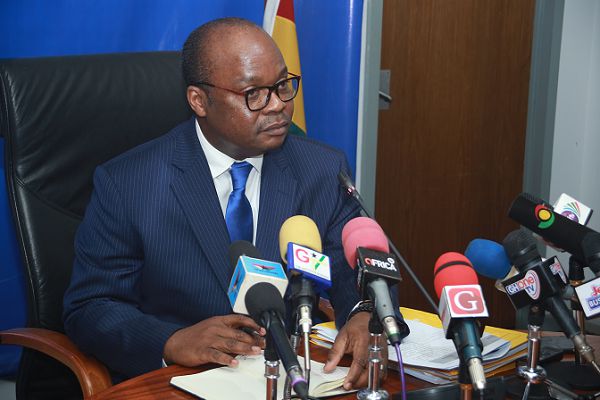Dr Ernest Addison, Governor of the Bank of Ghana (BoG), has announced that the central bank has seen an increase in its gold reserves this year.
He said by June 30, the BoG had added more than 7.70 tonnes of monetary gold to its gold reserves, of which the mining firms accounted for about 80 percent and the remaining 20 percent was from the Artisanal Small-scale Mining (ASM) sector via an approved aggregator.
He said the increment was made through the Domestic Gold Purchase Programme, which was introduced in 2021 to increase the central bank’s gold reserves by purchasing domestically produced gold using the local currency.
Dr Addison was speaking at the fourth edition of the Ghana Gold Expo and Mining Week, which was held on the theme: “Sustainable Mineral Resources Development and Well-being of Mining Communities,” in Takoradi.
It was organized by the Western Regional Coordinating Council (WRCC) in collaboration with ViewTag Ghana Gold Expo, a partner of Aurum Monaco and leader of the Global Responsible Jewellery Council and the United Nations Environmental Programme.
It provided a multi-sectorial platform for stakeholders to share ideas and information on the investment opportunities and challenges in the African gold sector to help implement strategies for accelerated growth in the mining industry.
The BoG Governor noted that before the introduction of the Programme in June 2021, Ghana’s gold holdings had remained at 8.77 tonnes over the years.
Dr Addison indicated that the key objective of the programme was to leverage gold holdings to raise cheaper sources of financing to provide short-term foreign exchange liquidity.
It was also meant to increase foreign exchange (FX) reserves, diversify the FX reserves portfolio, and foster confidence in the economy through improved FX reserves and currency stability to attract more foreign direct investment and increase economic growth.
According to him, the bank’s aim of doubling its gold reserves from 8.77 tonnes to 17. 4 tonnes in five years through the DGPP was yielding positive results saying, “Indeed, we are on course to more than double the level of the central bank’s gold reserves by the end of this year, well ahead of the target initially set”.
The increase in the gold reserves of the Bank, he explained, provided additional buffers which would help the economy to withstand future global economic shocks, build resilience and manage the impact of macroeconomic imbalances better.
“The Bank will gradually expand the suppliers in the ASM sector under the Responsible Sourcing Framework while working closely with the Precious Minerals Marketing Company in adopting and integrating our Responsible Sourcing & Due Diligence Framework in their operations geared towards the formalization drive. We will also work with the key stakeholders and the mining regulator to improve upon standards of the community Mines to be an important gold supplier,” Dr Addison indicated.
He, however, noted that effective mechanisms were being put in place to address the menace associated with unlicensed miners who violated sustainable mining practices.
Dr Addison added: “It is our expectation that as the benefits of the DGP programme become tangible to all the players in the value chain, activities of these illegal operators will be reduced or made to align with responsible mining practices as the economic and legal costs of operating outside the Law will be prohibitively expensive”







